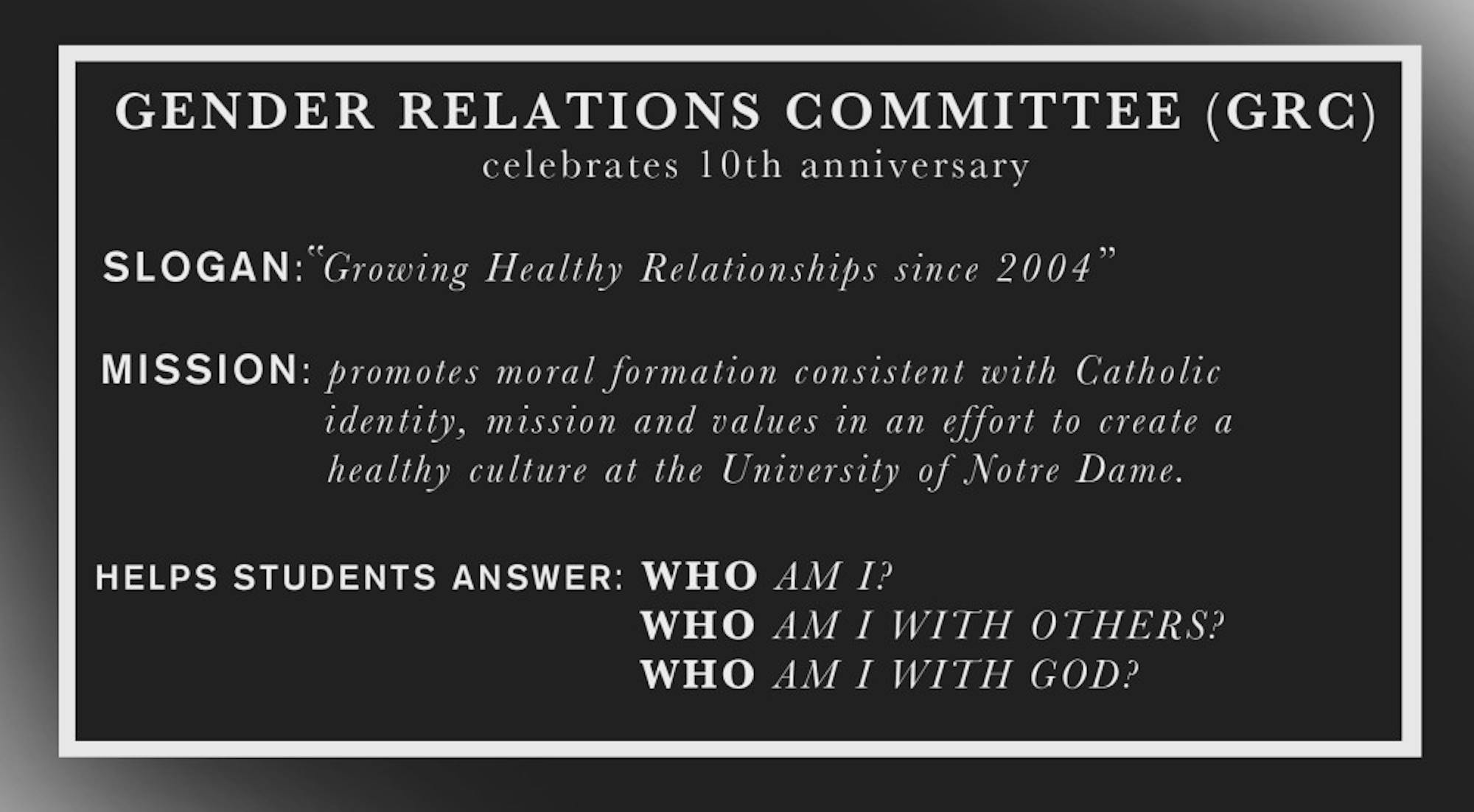The Notre Dame Gender Relations Center (GRC) will celebrate its 10th anniversary this Wednesday from 7 p.m. to 9 p.m. in the Dooley and Sorin Rooms of LaFortune Student Center. The open house will consist of informational activities showcasing the work the GRC has done over the past 10 years and a hot chocolate bar, Danielle Aase, a student event coordinator with the GRC, said.
“There will also be a suggestions box for students to submit ideas for potential programs they would like to see in the future.”
Past events have included distributing t-shirts in the dining halls and in LaFortune Student Center, Regina Gesicki, assistant director of educational initiatives at the GRC, said. The design included a depiction of a tree, with the branches representing the different topics the GRC focuses on and its anniversary year slogan, “Growing Healthy Relationships since 2004,” Gesicki said.
“We're planning events throughout the 2014-2015 academic year,” Gesicki said. “In the spring semester, we plan to host a panel discussion about the GRC's … alum and staff who have shaped … its history.”
The Gender Relations Center opened on a part-time basis in the fall of 2004 and became a full department in the Division of Student Affairs in the fall of 2005, Gesicki said. Heather Rakoczy Russell, the Pangborn Hall Rector at the time, served as the founding director, Gesicki said.
“In the few years prior to the GRC's founding, the first female student body president, Brooke Norton, and other campus student leaders had called for the creation of a University-sponsored 'Center for Men and Women,’” Gesicki said.
The difference between Notre Dame’s Gender Relations Center and other similar centers at other universities lies in the fact that the Notre Dame GRC focuses on both women and men.
“This breadth is one unique aspect of the GRC," Gesicki said. "Though loosely modeled on women's centers at other top 25 universities, the GRC was, from the outset, meant to serve as a resource for all students at Notre Dame as they navigate healthy relationships, gender and sexuality within the Catholic character of the University."
The GRC is dedicated to promoting moral formation in order to create a healthy culture at Notre Dame, Gesicki said. It seeks to engage the campus in respectful dialogue and to build a community honoring the human dignity of all students.
“As an office in the Division of Student Affairs, the GRC designs and implements programs about healthy relationships, gender and sexuality consistent with the Catholic character of the University,” Gesicki said. “It creates dialogue on campus by collaborating with student groups, other departments at Notre Dame and community organizations in South Bend.”
Aase said she learned about the Gender Relations Center during freshmen orientation and knew right away she wanted to get involved.
“I think the GRC is incredibly important because it facilitates conversations that I believe are necessary to have on campus – ones that help our community become stronger,” Aase said. “The GRC puts on programming about topics such as healthy relationships, sexual and gender identity and violence prevention.
“I think educating people on these topics makes the community a healthier and more welcoming place."
Some notable milestones in the 10-year history of the GRC have included the transition from a part-time to a full-time staff, Gesicki said. By fall 2010, the GRC’s office space, programming and budget had all quadrupled from their initial size, Gesicki said.
“We also expanded in ways that allowed us to delve further into the intersectionality of identities, with the hiring of an assistant director for outreach services, a position that included 'Men & Masculinity' initiatives in 2012, and assistant director for LGBTQ student concerns in 2013,” Gesicki said.
The GRC also sponsors various training sessions for students, staff and faculty, Gesicki said.
“We offer support and guidance to students as they seek to answer three important questions: Who am I? Who am I with others? Who am I with God?” Gesicki said. “We provide opportunities for leadership development through various roles in our student leader program: FIRE Starters, event facilitators and dorm commissioners, as well as student office assistants.
“We strive to provide varied opportunities for students to learn to develop healthy and safe relationships, while acknowledging and lifting up the inherent dignity of self and other as those created in God's likeness.”













